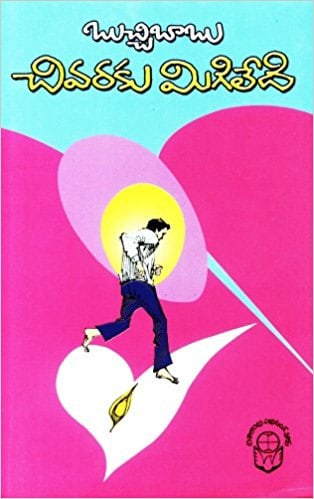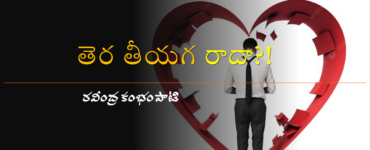Chivaraku Migiledi: Buchchibabu; Pallavi Publications, Vijayawada, Fifth edition 1986; Price Rs25-00 Pages 420
When an individual wants to live life on his own terms and in the process has to go through various struggles along with confrontations with society, near and dear, he ends up asking himself what has he achieved and what remains at the end. That is the storyline of this unique novel. The author Bucchibabu catapulted to fame with this novel because thus far Telugu literature had not seen novels in the genre of deep philosophical and psychological reflections of this nature. The story centres around the main protagonist Dayanidhi, called Nidhi, for short.
Bucchibabu, whose pen name was Sri Sivaraju Subba Rao, was born in Eluru, West Godavari district, on 14th June 1916 to Sivaraju Suryaprakasa Rao and Venkayamma. His early education was in Kankipadu, then in Palakollu, and finally A.C. College Guntur where he completed his degree. He went on to do B.A (Hons) in Madras (now Chennai) and in 1941 he awarded an M.A degree from Nagpur University. After working for a few years in Visakhapatnam and Anantapur in 1945 he joined All India Radio and worked there the rest of his life. He died on September 20th 1967. In addition to being a novelist, he was also a playwright and a short story writer. He was married to Sivaraju Subbalakshmi, who is a writer of repute in her own right. In addition to Chivaraku Migiledi (What Remains at the End he wrote a Poetry collection called Ajnaanam, (Ignorance) and novels such as Ashavaadi (Optimist), Aadyantaala Madhya Radha (Beginning and End Radha in-between), Naa Antaranga Kathanam (The Story of My Inner Mind, the first part of his autobiography), Atmavanchana (Self Deceit, play) and Medametlu (Stair-case, Short stories)
This novel according to the author was started in 1942 and it appeared as a serial in a magazine called “Navodaya” in 1946. He writes an introduction to the book, which in itself is a literary master piece, as it describes in detail the nuances of this complex novel.
When the story opens Dayanidhi was a doctor in the making. He was almost at the end of his medical education and people start asking him when was he getting married, and where was he going to start his practice etc. He was undecided about most of these things though he did not rule out the possibility of starting his practice in his own village. He belongs to Sircar districts in Andhra Pradesh and he happens to visit the Rayalaseema region and had to spend time there. What puzzles him is the cultural difference between the two regions and how there was a natural animosity between the people due the differences in social, cultural and economic aspects of life in these two regions.
Though he belongs to Sircar districts, he fails to integrate himself with the people, their curiosities, their mindsets and moves to Rayalaseema where he is happy for a long time till his reputation follows him and he is compelled to relocate again. There was one part of his past which haunts him everywhere he goes. His mother’s life has an unrevealed past which attracts the ire of the society. He is haunted by her misdeeds, which he never directly talks about. His life though, bears the brunt of the mistake committed by his mother. Every time he faces confrontation due to this, it upsets him and he subjects himself to suffering and sadness caused not by any of his fault. In his own family, there were some connections where his mother was remembered by various people in different ways.
Suseela his cousin thinks of her as an affectionate aunt, but Nidhi suddenly realises that it was only a façade and she did not have any respect for his mother. She was also not greatly attached to him. When the question of marriage was discussed Nidhi was indifferent and Suseela did not also show any interest. Later on, she gets seduced and gives birth to a baby out of wedlock and dies in childbirth. Towards the end Nidhi suspects that after all though she refused to marry him maybe she was in love with him. That may be because she could not marry the fellow she had child with and and was not happy with the man she married, which was a marriage arranged by her father. The man was Nidhi’s friend and Nidhi was aware of his disease STDs.
The second woman who was close to Nidhi was Amrutham, another cousin who was married to a farmer in a nearby village. She feels closely attached to Nidhi and they share many intimate personal aspects of their life with each other. But she was married and Nidhi feels she did not really love her husband but she never agreed to this and always showed a deep attachment. But once after Nidhi was married, she visits him for a few days and provokes him into getting physical with her which he regrets later. He was legally married to Indira, the daughter of Madhavayya,, who was a lawyer. Nidhi did not actually believe in the institution of marriage but tells himself and others that he consented to marry for the sake of his father and the society which otherwise may club him with his mother’s history. But immediately after marriage, even before the marriage was consummated, Indira’s father objects to his political ideology, as Nidhi courts arrest and is jailed for protesting against the British. His father-in-law, though influential enough to get him released, did not get him bail but saw to it that he was not sentenced. Indira never joins him after marriage as she was attached to her father and did resent his refusal to listen to her father. Many people try to reconcile them but both Nidhi and Madhavayya stuck to their stance and thus Nidhi’s marriage ends in misery.
Eventually she gets sick with tuberculosis and regrets her decision not to join Nidhi after marriage and dies longing for him. As a matter of duty Nidhi goes to see her but somehow, her condition does not touch his heart. When she dies, he performs her last rites as expected. Madhavayya ends up feeling sorry for isolating Nidhi. The last and most important relationship in his life was Komali, who enters his life in his youth. He was impressed by her beauty though not by her behaviour and mannerisms. She and her mother survived on sex trade. Komali was young and had entered her mother’s business. Nidhi’s attraction leads him to think of reforming her, educating her and making her a better human being. Here also he consistently refuses any physical relationship with her. Though she was not of his class as the society thinks, she understood him better than all other women in his life. When in Rayalaseema he faced public anger as the story of his mother and his failed marriage reached the place, Komali stands by his side. He establishes a hospital in his mother’s name, looks after the medical needs of the village, and yet, nothing prevented them from destroying his mother’s statue or the hospital and Nidhi’s life comes back to square one.
When he looks back on his life Nidhi feels that he was responsible in many ways for his troubles. His life was always in confrontation with the hatred he had to bear. But that was not his problem, it was lovelessness in his life that causes all the heartburn. There were four women who come close to him, but he did not love any of them. He did not also hate them. He was humane, friendly and concerned for all of them but was never attracted enough to fall in love with any of them. Komali came close as she reconciled herself to his detachment and desire to stay away from physical relationship.
Another important aspect of the novel is the action that takes place throughout in the mind of protagonist. The questions, the philosophical discourses, the debates about the right and wrong of things always take place in his mind. He was constantly at loggerheads with himself. But he was constantly haunted by doubts about the rights and wrongs of his actions. His unwillingness to marry, his fear of attachments to any one on a long-term basis, his aversion to whosoever talks derogatively about his mother; all these related conflicts take place in his mind. Whenever people try to advise him except in the case of Narayya, his loyal farmhand, he refused to take the advice but continues to pursue whatever he values and believes to be important for his sense of sincerity and integrity. Almost all the people he came in touch with did not realise his inborn sincerity and sense of natural justice.
Suseela, whom he considered marrying purely because his family wanted it, refused to marry him as she misunderstood his relationship with Komali and Amrutham. Amrutham was fully aware of his attachment to Komali, tried to encourage him to marry her if it gives him happiness, but then he was afraid of her reputation in society and was probably put off that he would have to suffer like his father did due to his mother’s weakness. He was attached to his mother but could not appreciate her “misbehaviour.” Indira, his wife, he should not have married, as he was not interested in her and he admits to marrying her only for the sake of society and his father. It was not fair to her but she did not have a choice as her father insisted on it.
And the same father did everything he could to sever all connections with Nidhi as he went against the British and proved himself to be a nationalist. Finally ailing, lonely and deeply unhappy she dies an unfortunate death. Nidhi never gave any hope of love to any of these women, but he constantly analysed their nature and wondered what kind of inner nature provokes women to develop their relationships. The novel is thus a first of its kind, a psychological warfare Nidhi wages with his self, his relations, family, friends and society. But his questioning nature gave him hope to look for new beginning every time he fails. He changed his place of living and work from his village, from the hospital he started and from there to the Rayalaseema where the diamond he found gave him impetus to start a hospital in his mother’s name, where he found happiness but that did not last long. The arrival of Komali and the rumours persisting about his multiple relationships again forces him to leave the place and move on to a new place with a new hope. What remains in the end… is probably is this sense of hope.
*









Well written